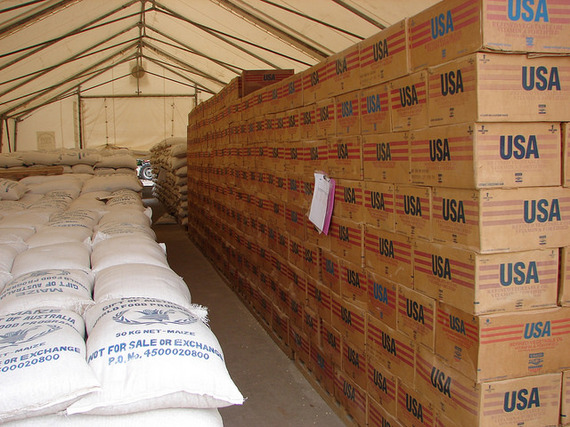Last month, the House of Representatives passed the Coast Guard and Maritime Transportation Act of 2014, legislation that will drastically impact the United States' ability to provide vital food aid to millions of hungry people worldwide. Behind closed doors, the House slipped in a provision that increases the percentage of U.S. food aid required to be shipped on private U.S. shipping vessels. In effect, this takes away an additional $75 million per year from the much-needed U.S. international food-aid programs.
This change will take away life-saving food from millions of hungry people worldwide in order to benefit just a handful of shipping companies that control the shipment of food aid.
The U.S. divisions of three private, foreign-owned companies in particular make up a considerably large share of the U.S. vessels that benefit from the cargo preference: the A.P. Moller-Maersk Group (Denmark), the world's biggest container-shipping company, Hapag-Lloyd (Germany), and Wallenius (Norway/Sweden).
Two years ago, Congress lowered the percentage of food required to be shipped on U.S. vessels from 75 percent to 50 percent in an effort to decrease costs. Then last year, Congress passed legislation in a bipartisan manner to improve the efficiency and effectiveness of U.S. food-aid programs, while being able to feed up to 800,000 additional people.
The recent proposed increase to cargo restrictions will erase all of the gains that were made, and will deny assistance to at least two million and up to four million hungry people worldwide.
It's horrendous that lawmakers would even consider taking food from hungry people in order to support just a few shipping companies. However, many politicians and labor groups are astonishingly supportive of this change despite its devastating impact on the world's most vulnerable people.
In fact, to some politicians, the number one priority for food aid is not to distribute food. For example, Rep. Duncan Hunter (R-Calif.) said recently, "The secondary reason for food aid is food. The No. 1 reason is military readiness." This is outrageous, particularly when one considers a recent study that 70 percent of U.S.-flagged vessels eligible to carry food aid failed to meet the Department of Defense's definition of a militarily useful vessel anyway. Clearly, some of our lawmakers have lost their way.
The Obama administration strongly opposes raising the cargo restrictions, but in a world where 842 million people go hungry daily, why isn't there more outrage? Why is it acceptable for Congress to subsidize the shipping industry by taking away the little that's allocated for the world's hungry and poor people?
Proverbs 31:8-9 tells us to "speak out for those who cannot speak, for the rights of all the destitute. Speak out, judge righteously, defend the rights of the poor and needy." Special-interest favors to the shipping industry should not create additional hardship for hungry and poor people globally. This provision does nothing to protect the poor and needy. At best, it is morally imbalanced.
Supporters of the bill argue that it boosts the U.S. economy by enabling and requiring shippers to "buy American" and employ more U.S. workers. However, the "U.S. shipping vessel" designation is an ambiguous one. As the New York Times recently reported, "some of the U.S. companies that own the ships are units of foreign firms," allowing a few large foreign shipping lines to benefit from the suffering of millions and from the generosity of our government.
Simply put, U.S. food aid works for its intended purpose: to fight long-term hunger and respond quickly in emergency situations. This is about the millions of lives saved with U.S. food aid and its long-term benefits in developing countries -- benefits that will be diminished if this bill is passed. At a time when crisis situations are getting worse for hungry people in places like Syria and South Sudan, we need to be thinking of ways to reach more people, not fewer.
Bread for the World's 2014 Offering of Letters campaign seeks to reform U.S. food-aid programs so that funds are used more effectively and efficiently. We've worked for several years, along with other organizations, urging lawmakers to reform U.S. international food aid to help more people facing hunger and malnutrition, more quickly and at a lower cost. This bill is a significant step backward.
God's grace in Jesus Christ moves us to help our neighbors, whether they live next door or in the next country. It is our moral imperative to feed "the least of these," not take food away from them to boost shipping interests. Therefore, we strongly oppose any legislation that increases transportation costs and decreases the effectiveness of U.S. international food-aid programs.
